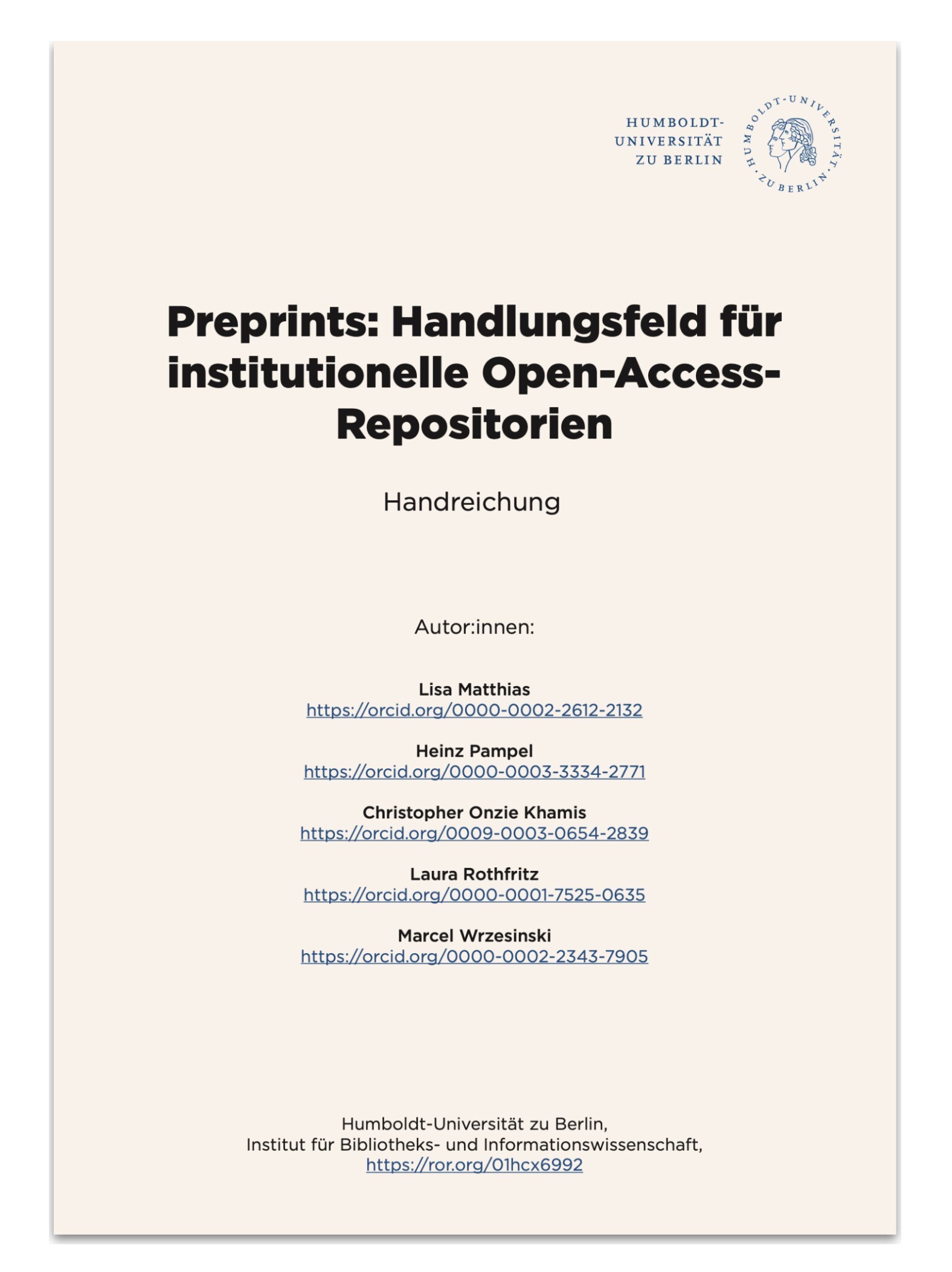We are excited to share our first guide from the BMFTR-funded (Federal Ministry for Research, Technology and Space) project “Professionalisierung der Open-Access-Repositorien-Infrastruktur in Deutschland (Pro OAR DE)”: “Preprints: Handlungsfeld für institutionelle Open-Access-Repositorien” (German only.)
Matthias, L., Pampel, H., Khamis, C. O., Rothfritz, L., & Wrzesinski, M. (2025). Preprints: Handlungsfeld für institutionelle Open-Access-Repositorien. Pro OAR DE Handreichung. Zenodo. https://doi.org/10.5281/zenodo.15603096

This publication stems from our November 13, 2024 networking forum on preprints and institutional repositories, which brought together 59 Open Access professionals from across Germany. The guide captures the collective expertise and insights generated during this collaborative event, offering practical recommendations to enhance how institutional repositories handle preprints.
Following expert presentations by Lea-Maria Ferguson (Helmholtz Open Science Office) and Alexander Wagner (DESY), participants engaged in dynamic discussions in a “world café” format where they shared experiences and developed solutions to common obstacles. The presentation slides are available online.
The guide distills these rich discussions into actionable recommendations across five critical areas for repository managers:
1. Policy for Preprints
Without overarching standards, institutions struggle with unclear definitions distinguishing publication types. Proposed solutions include establishing clear typological classifications at submission, setting explicit criteria for different preprint versions, implementing automated notification systems for updates, and creating robust links between preprints and their final published versions.
2. Accessibility Workflows
Repository managers face a complex web of challenges: the relationship between institutional and subject-specific repositories, technical representation issues, and limited researcher awareness about the strategic implications of preprints. Solutions include fostering cross-institutional dialogue, setting focused goals to reduce maintenance overhead, and providing comprehensive consultation services that empower researchers to make informed publication decisions.
3. Versioning
Three major barriers complicate version management: First, many repository systems simply lack versioning functionalities. Second, those with versioning capabilities must navigate the trade-off between merge approaches and split approaches. Third, authors have no obligation to report when their preprints are subsequently published, making it difficult to track version evolution. The community strongly advocated for early publication counseling and proactive author engagement to map out publication trajectories and develop appropriate pathways collaboratively.
4. Disciplinary Diversity
Preprint definitions and practices vary across disciplines, creating workflow complexities that require tailored solutions and generating reporting issues when publications appear across multiple platforms and stages. This diversity demands flexible approaches: facilitating faculty-level decision-making, establishing discipline-specific editorial networks for quality assurance, and emphasizing the critical role of high-quality metadata.
5. Further Challenges
Communication barriers with publishers (particularly in the humanities), absent technical standards for metadata transfer and linking, and limited training opportunities for repository managers continue to hinder progress. Highlighted solutions include targeted outreach to academic communities, developing robust technical interfaces for better interoperability, establishing preprint policies with clear Persistent identifier (PID) recommendations, and expanding professional development programs both nationally and internationally.
This guide provides a foundation for continued professional exchange. Repository operators, libraries, and institutional decision-makers will find valuable insights for strategically embedding preprints within their institutions.
We extend our sincere thanks to all forum participants who contributed their expertise and experience to this collaborative effort. We welcome your feedback and look forward to continuing this important dialogue as we collectively strengthen the Open Access repository landscape.
The Pro OAR DE project continues with its sixth Networking Forum on July 7, 2025, focusing on “Compliance with Funding Requirements for Open Access.” We are delighted to welcome representatives from the European Research Council (ERC) and the German Research Foundation (Deutsche Forschungsgemeinschaft, DFG), who will provide insights into their repository strategies and Open Access policies. Registration is now open for this virtual event.
For more information about Pro OAR DE and our upcoming activities, please visit our official website. This text – excluding quotes and otherwise labeled sections – is licensed under the CC BY 4.0 DEED.
References
Citation
@online{matthias2025,
author = {Matthias, Lisa and Pampel, Heinz and Onzie Khamis,
Christopher},
title = {Networking for the {Advancement} of {Institutional} {Open}
{Access} {Repositories} in {Germany}},
date = {2025-06-23},
url = {https://doi.org/10.59350/kb3zc-v2x38},
langid = {en}
}